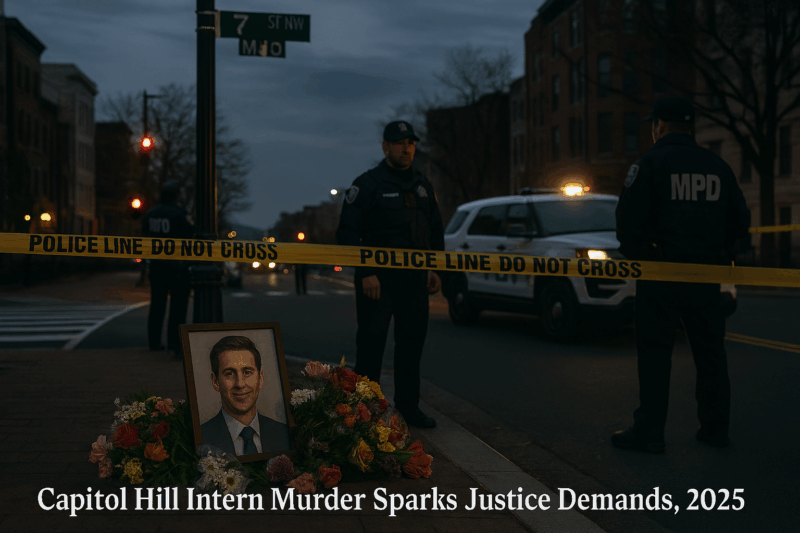A Tragedy Shakes the Nation’s Capital
On June 30, 2025, Eric Tarpinian-Jachym, a 22-year-old University of Massachusetts student interning for Rep. Ron Estes, was fatally shot in Washington, D.C., just one mile from the White House. The arrest of two 17-year-old suspects, Jailen Lucas and Kelvin Thomas Jr., on September 5, 2025, marks a step toward justice, but a third suspect remains at large. This case has ignited debates over juvenile crime, urban safety, and accountability, resonating deeply in a city grappling with rising violence.
Human Toll of a Senseless Loss
Eric Tarpinian-Jachym’s death devastated his family, friends, and community. A rising senior from Granby, Massachusetts, Eric was remembered for his cheerful demeanor and dedication to public service. His mother, Tamara Jachym, expressed frustration with D.C.’s local leadership, feeling the Trump administration showed more concern for her son’s case. For interns and residents in D.C., the murder underscores fears of urban violence, with 2025 homicide rates up 15% from the previous year. The suspects, with prior violent records, highlight the personal and societal toll of unchecked juvenile crime.
Facts and Figures of the Case
The two teens, Jailen Lucas and Kelvin Thomas Jr., were charged with first-degree murder while armed, facing trial in adult court due to the severity of the crime. U.S. Attorney Jeanine Pirro noted their prior violent records in family court, criticizing D.C.’s past leniency toward juvenile offenders. Metropolitan Police Department (MPD) Chief Pamela Smith expressed confidence in apprehending the third suspect, whose identity remains undisclosed. The shooting occurred at 7th and M Streets NW, a busy area, with D.C. reporting 136 homicides in 2025, compared to 118 by this point in 2024. The FBI and MPD’s joint efforts led to the arrests, announced on September 5.
Broader Context: Juvenile Justice and Urban Safety
This case reflects broader issues in D.C.’s criminal justice system. Juvenile violent crime in the city has risen 22% since 2022, with carjackings and armed robberies up sharply. Critics, including Pirro, argue that D.C.’s family court system has been too lenient, allowing repeat offenders to evade serious consequences. Nationally, juvenile arrests for violent crimes increased 7% from 2021 to 2024, per FBI data. The murder also echoes other high-profile D.C. incidents, like the August 2025 assault on former DOGE staffer Edward Coristine, where two teens were charged but released to lenient supervision. Globally, urban centers face similar challenges balancing rehabilitation with public safety.
Political and Community Reactions
The case has fueled political rhetoric, with FBI Director Kash Patel linking the arrests to Trump’s “law and order” agenda. Attorney General Pam Bondi promised “severe justice” if the suspects are convicted. However, Tamara Jachym’s claim that the Trump administration cares more than D.C.’s council highlights local tensions, as Mayor Muriel Bowser faces criticism for rising crime rates despite a $20 billion budget.
What Lies Ahead: Justice and Prevention
The pursuit of the third suspect and the upcoming trials will test D.C.’s justice system. Convictions could lead to life sentences, given the first-degree murder charges. Community advocates call for preventive measures, like expanding youth programs, which reduced juvenile crime by 15% in pilot areas in 2024. Nationally, the case may spur debates on juvenile justice reform, potentially influencing policies on trying minors as adults. Globally, cities tackling youth crime, like London’s knife crime initiatives, offer models for balancing enforcement and rehabilitation.
Conclusion: A Call for Accountability
The murder of Eric Tarpinian-Jachym and the arrest of two teens underscore the urgent need for accountability in D.C.’s justice system. As the city seeks a third suspect, the tragedy galvanizes demands for safer streets and stronger measures to curb juvenile crime. Eric’s legacy, tied to his service and potential, compels action to ensure such losses are not in vain.






